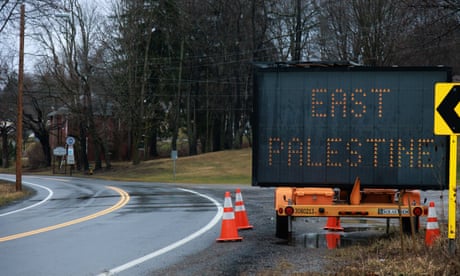- by foxnews
- 12 Mar 2025
Ohio senators introduce safety rules after toxic train derailment disaster
Ohio senators introduce safety rules after toxic train derailment disaster
- by theguardian
- 02 Mar 2023
- in politics

The Railway Safety Act of 2023 is cosponsored by Sherrod Brown and JD Vance, a Democrat and Republican, and others of both parties.
The bill responds to the derailment of a Norfolk Southern train near the Pennsylvania border on 3 February, when 38 cars derailed and more burned.
Though no one was injured or killed, the accident imperiled neighborhoods in both states, prompting an evacuation of about half the 4,000 residents of East Palestine, a multi-agency emergency response and worries about health impacts.
The new bill aims to address questions including why the Ohio state government was not made aware the hazardous load was coming through and why the crew did not learn sooner of an impending malfunction.
Under the bill, all trains carrying hazardous materials, including those that do not fall under existing regulations for high-hazard flammable loads, would face new requirements. Carriers would need to create emergency response plans and provide information and advance notification to emergency response commissions in each state a train passes through.
Hazardous materials shipments account for 7% to 8% of roughly 30m railroad shipments in the US each year. But almost any train, aside from grain or coal trains, might carry one or two cars of hazardous materials, because railroads often mix shipments.
The Association of American Railroads says 99.9% of hazardous materials reach their destinations safely, and railroads are generally regarded as the safest option to transport chemicals on land.
Railroad unions argue that operational changes and widespread job cuts have made railroads riskier. They say employees are spread thin and train crews deal with fatigue because they are on call 24/7.
Under the Senate bill, the US Department of Transportation would be required to revisit rules on train size and weight and to work to stop delays causing trains carrying hazardous loads to block rail crossings.
Train lengths have grown to two miles or more, as railroads streamline operations. Unions say longer trains are more prone to problems and can clog lines because they extend farther than sidings off main tracks.
The bill also requires railroads to pay for hazardous materials training for first responders.
The National Transportation Safety Board determined the crew in East Palestine was alerted by a device detecting overheating bearings, but not soon enough to prevent the crash. Federal regulators have urged rail operators to re-examine practices regarding such detectors. The Senate proposal would make them more prevalent.
The bill would set requirements for installing, maintaining and placing the devices and mandate they scan trains carrying hazardous materials every 10 miles, twice as often as the East Palestine train was scanned. No federal requirements exist for wayside detectors, though they are widely used.
The Federal Railroad Administration would be required under the bill to update inspection regulations to ensure cars carrying hazardous materials receive regular checks. Railcar inspectors previously had about two minutes to inspect every car but now get about 30 to 45 seconds, unions say. Signalmen who maintain signals and warnings at crossings have bigger territories to cover.
Two Democrats, Chris Deluzio of Pennsylvania and Ro Khanna of California, have introduced a separate bill in response to East Palestine in the Republican-held House.
- by foxnews
- descember 09, 2016
Daring airport trend has travelers arriving at gate 15 minutes before takeoff
Flight passengers are participating in the new viral trend, "airport theory," with flyers arriving at their gates 15 minutes before their flights depart. A travel expert weighs in.
read more





